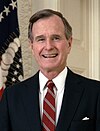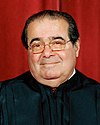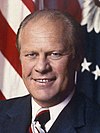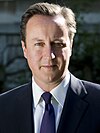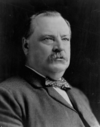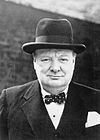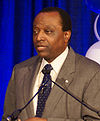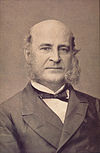Portal:Conservatism/Selected article
There are 32 selected articles.
Guidelines
The layout design template for these subpages is at Portal:Conservatism/Selected article/Layout.
Add a new selected article to the next available subpage. The list of selected articles should only be related to conservatism. Additionally, it is preferred to include articles that have been given a quality rating of either featured or good.
The format of the blurbs is a single paragraph that is roughly 1,200 characters or less in total length with no reference tags, alternate names, or extraneous bolding. Only the link to the specified article is bolded. For biographies, birth and death dates are trimmed down to year only.
Selected articles
Selected article 1
Portal:Conservatism/Selected article/1
Ronald Reagan (1911–2004) was the 40th president of the United States from 1981 to 1989, after having a career as governor of California and in Hollywood.Early in his presidency, Reagan implemented sweeping new political and economic initiatives. His
Selected article 2
Portal:Conservatism/Selected article/2
George H. W. Bush (1924–2018) was the 41st president of the United States from 1989 to 1993, after serving as the 43rd vice president and various federal positions.In the 1988 presidential election, Bush launched a successful campaign to succeed Ronald Reagan as president, defeating Democratic Party nominee Michael Dukakis. Bush's presidency was driven by foreign policy during a time of world change as military operations were conducted in Panama and the Persian Gulf. Additionally, the Berlin Wall fell in 1989 and the Soviet Union dissolved two years later. In the wake of economic concerns, he lost the 1992 presidential election to Democrat Bill Clinton.
Selected article 3
Portal:Conservatism/Selected article/3
Antonin Scalia (1936–2016) was an American jurist who served as an associate justice of the Supreme Court of the United States from 1986 until his death in 2016. He was described as the intellectual anchor for the originalist and textualist position in the Supreme Court's conservative wing. For catalyzing an originalist and textualist movement in American law, he has been described as one of the most influential jurists of the twentieth century, and one of the most important justices in the history of the Supreme Court.In his quarter-century on the Supreme Court, Scalia had staked out a conservative ideology in his opinions, advocating
Selected article 4
Portal:Conservatism/Selected article/4
TheIn the 1980s, under the Reagan Doctrine, the United States increased diplomatic, military, and economic pressures on the Soviet Union, at a time when the nation was already suffering economic stagnation. In the late 1980s, Soviet President Mikhail Gorbachev introduced the liberalizing reforms of perestroika ("reconstruction", "reorganization", 1987) and glasnost ("openness", ca. 1985). The Cold War ended after the Soviet Union collapsed in 1991, leaving the United States as the dominant military power. Russia rejected Communism and was no longer regarded as a threat by the U.S. The Cold War and its events have had a significant impact on the world today, and it is often referred to in popular culture, especially films and novels about spies.
Selected article 5
Portal:Conservatism/Selected article/5
As President, Ford signed the
Selected article 6
Portal:Conservatism/Selected article/6
During the Vietnam War, he nearly lost his life in the 1967 USS Forrestal fire. In October 1967, while on a bombing mission over Hanoi, he was shot down, seriously injured, and captured by the North Vietnamese. He was a prisoner of war until 1973. McCain experienced episodes of torture, and refused an out-of-sequence early repatriation offer. His war wounds left him with lifelong physical limitations.
While generally adhering to conservative principles, McCain at times has had a media reputation as a "maverick" for his willingness to disagree with his party on certain issues. He secured the Republican nomination in 2008 after coming back from early reversals, but lost to Democratic candidate Barack Obama in the general election.
Selected article 7
Portal:Conservatism/Selected article/7
TheThe best-known version of the Bricker Amendment, considered by the Senate in 1953–54, declared that no treaty could be made by the United States that conflicted with the Constitution, was self-executing without the passage of separate enabling legislation through Congress, or which granted Congress legislative powers beyond those specified in the Constitution. It also limited the president's power to enter into executive agreements with foreign powers. Despite initial support, the Bricker Amendment was blocked through the intervention of President Eisenhower and failed in the Senate by a single vote in 1954.
Selected article 8
Portal:Conservatism/Selected article/8
A first candidacy for
In the
Selected article 9
Portal:Conservatism/Selected article/9
In a
A series of terrorist attacks occurred eight months into Bush's first term as president on
Selected article 10
Portal:Conservatism/Selected article/10
Selected article 11
Portal:Conservatism/Selected article/11
SirWhen in 1864 no party proved capable of governing for long, Macdonald agreed to a proposal from his political rival,
Selected article 12
Portal:Conservatism/Selected article/12
Selected article 13
Portal:Conservatism/Selected article/13
SirDuring the 1930s, Churchill took the lead in warning about the danger from Hitler and in campaigning for rearmament. On the outbreak of World War II, he was again appointed First Lord of the Admiralty. On 10 May 1940, Churchill became Prime Minister in an all-party government. His steadfast refusal to consider defeat, surrender or a compromise peace helped inspire British resistance, especially during the difficult early days of the War when Britain stood alone in its active opposition to Hitler. Churchill was particularly noted for his speeches and radio broadcasts, which helped inspire the British people.
Selected article 14
Portal:Conservatism/Selected article/14
TheSelected article 15
Portal:Conservatism/Selected article/15
Selected article 16
Portal:Conservatism/Selected article/16
Selected article 17
Portal:Conservatism/Selected article/17
Historians have since connected the overwhelming success of Save Our Children with the organization of conservative Christian participation in political processes. Although forceful Christian involvement had not taken a widespread role in politics in the United States since 1925, Within two years the Reverend Jerry Falwell developed a coalition of conservative religious groups named the Moral Majority that influenced the Republican Party to incorporate a social agenda in national politics.
Selected article 18
Portal:Conservatism/Selected article/18
TheIt first contested Alberta's
Selected article 19
Portal:Conservatism/Selected article/19
TheSelected article 20
Portal:Conservatism/Selected article/20
Selected article 21
Portal:Conservatism/Selected article/21
Coolidge restored public confidence in the White House after the scandals of his predecessor's administration and left office with considerable popularity. As a Coolidge biographer put it, "He embodied the spirit and hopes of the middle class, could interpret their longings and express their opinions. That he did represent the genius of the average is the most convincing proof of his strength."
Selected article 22
Portal:Conservatism/Selected article/22
Kathleen Mary Margaret "Kathy" Dunderdale,Dunderdale was born and raised in
In the
Selected article 23
Portal:Conservatism/Selected article/23
Selected article 24
Portal:Conservatism/Selected article/24
Selected article 25
Portal:Conservatism/Selected article/25
InSelected article 26
Portal:Conservatism/Selected article/26
The Conservative Party is a centre-right political party in the United Kingdom that adheres to conservatism and unionism.The party emerged in 1834 out of the original Tory Party, which dates to 1678. The party was one of two dominant parties in the nineteenth century, along with the Liberals. It changed its name to Conservative and Unionist Party in 1912 after merging with the Liberal Unionist Party, although that name is rarely used and it is generally referred to as simply the Conservative Party.
Conservative prime ministers led governments for 57 years of the 20th century, including Winston Churchill (1940–45, 1951–1955) and Margaret Thatcher (1979–1990). Thatcher's tenure led to wide-ranging economic liberalisation, placing the Conservatives firmly as the most free market and eurosceptic of the three major parties. The party was returned to government in 2010 beginning with the more liberal leadership of David Cameron.
Selected article 27
Portal:Conservatism/Selected article/27
He is mainly remembered for his support of the cause of the
Burke was praised by both conservatives and liberals in the 19th century. Since the 20th century, he has generally been viewed as the philosophical founder of modern Conservatism, as well as a representative of classical liberalism.
Selected article 28
Portal:Conservatism/Selected article/28
The series depicts a near-future UK after a
Selected article 29
Portal:Conservatism/Selected article/29 The Daily Mail is a British, daily middle market tabloid newspaper owned by the Daily Mail and General Trust. First published in 1896 by Lord Northcliffe, it is the United Kingdom's second biggest-selling daily newspaper after The Sun. The Daily Mail was Britain's first daily newspaper aimed at the newly-literate "lower-middle class market resulting from mass education, combining a low retail price with plenty of competitions, prizes and promotional gimmicks", and the first British paper to sell a million copies a day. It was, from the outset, a newspaper for women, being the first to provide features especially for them, and is still the only British newspaper whose readership is more than 50% female. In the late 1960s, the paper went through a phase of being liberal on social issues like corporal punishment, but soon returned to its traditional conservative line.
Selected article 30
Selected article 31
Portal:Conservatism/Selected article/31
José Paranhos, Viscount of Rio Branco (1819–1880) was a politician, monarchist, diplomat, teacher and journalist of the Empire of Brazil. Rio Branco's work in the press, highlighting threats posed by the armed conflicts in the Platine republics (Argentina and Uruguay), attracted the attention of Honório Hermeto Carneiro Leão, Marquis of Paraná, who invited him to act as secretary on a diplomatic mission to Montevideo. In 1869, he dispatched to Paraguay, this time to negotiate an end to its war with Brazil. In 1871, Rio Branco became the president of the Council of Ministers for the first time. He would become the Council's longest-serving president, and his cabinet the second longest, in Brazilian history. His government was marked by a time of economic prosperity and the enactment of several necessary reforms. The most important of these initiatives was the Rio Branco Law, which granted freeborn status to children born to slave women. Rio Branco died in 1880 and was widely mourned throughout the country. He is regarded by most historians as one of Brazil's greatest statesmen.Selected article 32
Portal:Conservatism/Selected article/32
AThe concept of tradition, as the notion of holding on to a previous time, is also found in political and philosophical discourse. For example, the political concept of


